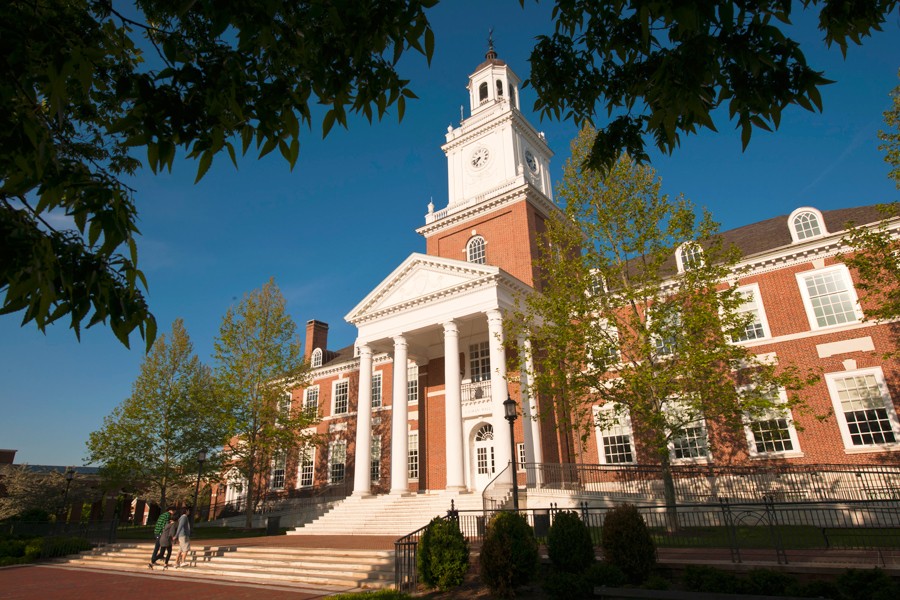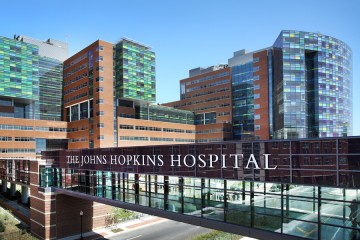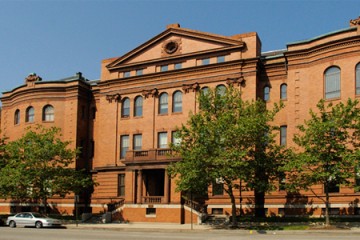The Johns Hopkins University is tied for 12th in the newest U.S. News & World Report "best colleges" rankings, up a notch from last year and the university's highest slot in 14 years.
Johns Hopkins was also rated seventh in a ranking by high school guidance counselors, tied with four other schools, and tied for eighth in a "peer assessment" by university presidents, provosts and deans. Both lists are components of the overall "best colleges" rankings.
The new ranking reflects an upward trend for Johns Hopkins, which ranked 15th among national universities in the fall of 2008 and since then has been listed 14th, tied for 13th, 13th alone (twice) and now tied for 12th.
"The energy of our students and the dedication of our faculty to those students are combining to build momentum at Johns Hopkins," said Ronald J. Daniels, president of the university. "When both teachers and students are absolutely driven by the desire to learn and the desire to discover, something very powerful happens."
A focus on building the Johns Hopkins' undergraduate experience "so it stands among the top 10 in the nation" is one of the goals Daniels outlined in "Ten by 2020," a report laying out the university's vision for the rest of the decade. The document commits Johns Hopkins to raising undergraduate student aid resources sufficient for need-blind admissions, pioneering innovations in teaching, and building new collaborative and social space for students, among other enhancements.
Until this year, Johns Hopkins had not landed in the top 12 in the U.S. News rankings since the lists published in 1999. That year, due largely to a one-year change in U.S. News' methodology, the university leaped from 14th to seventh. The following year, the methodology change was reversed and the university was 15th.
In the new ranking of national universities, Johns Hopkins is tied with Northwestern University, the school it trailed a year ago.
The university also ranked among the top programs in engineering, tied for 17th for undergraduate engineering education at schools offering a PhD. Johns Hopkins' biomedical engineering program remains ranked first, ahead of Duke, MIT, Georgia Tech, and the University of California-San Diego.
The university remains on U.S. News' separate annual lists of schools noted for socio-economic diversity and for value, or "great schools at great prices." The university made those lists with 41 percent of students on need-based financial aid, 14 percent receiving federal Pell grants, and an average discount from "sticker price" of 56 percent.
Johns Hopkins also remains on the magazine's list of schools known known for undergraduate research and creative projects, offering opportunities for undergraduates to do original work that elsewhere might be reserved for graduate students.
"At Johns Hopkins, the road that takes you from entering freshman to accomplished researcher is a broad one, with many on-ramps and exciting destinations," Daniels said.
Students find research opportunities or funding through the university-wide Provost's Undergraduate Research Awards, the Krieger School of Arts and Sciences' Woodrow Wilson Fellows and Dean's Undergraduate Research Awards programs, the Whiting School of Engineering's collaborative design courses, other programs and funding, and apprenticeships in labs throughout the university.
The U.S. News rankings compare colleges across a range of quantitative and qualitative measures, including freshman retention and graduation rates, and the strength of the faculty. More on the methodology can be found on the U.S. News website.
Posted in University News
Tagged u.s. news and world report










